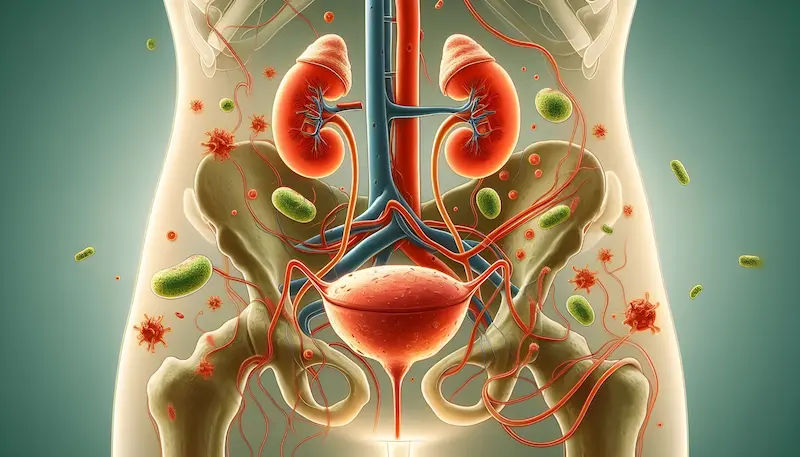Uric Acid Test Procedure and Normal Values
Learn about the uric acid test procedure, its importance in diagnosing gout and kidney issues, and understand normal uric acid levels for men, women, and children.

Written by Dr. Shaik Abdul Kalam
Reviewed by Dr. Rohinipriyanka Pondugula MBBS
Last updated on 13th Jan, 2026

If you’ve ever experienced joint pain, swelling, or discomfort, your doctor may have recommended a uric acid test. This simple blood test helps determine whether your uric acid levels are within a healthy range. High or low levels can indicate underlying health issues, including gout, kidney disease, or metabolic disorders.
In this article, we’ll explain everything you need to know about the uric acid test, including why it’s done, how it’s performed, what normal values mean, and how to manage abnormal levels.
What is Uric Acid?
Uric acid is a waste product formed when the body breaks down purines—substances found naturally in certain foods (like red meat, seafood, and alcohol) and also produced by the body. Normally, uric acid dissolves in the blood, passes through the kidneys, and is excreted in urine.
However, if the body produces too much uric acid or the kidneys can’t remove it efficiently, it builds up in the blood, leading to hyperuricemia (high uric acid). Over time, excess uric acid can form sharp crystals in joints, causing gout—a painful form of arthritis.
Why is a Uric Acid Test Done?
Your doctor may recommend a uric acid test if you have symptoms such as:
• Joint pain, redness, or swelling (especially in the big toe, ankles, or knees)
• Recurrent kidney stones
• Signs of kidney disease (fatigue, swelling, changes in urine output)
• Monitoring during chemotherapy or radiation (as these treatments increase uric acid levels)
The test helps diagnose:
• Gout
• Kidney disease or kidney stones
• Metabolic disorders
• Monitoring treatment effectiveness (for conditions like gout or leukemia)
Uric Acid Test Procedure
The uric acid test is a simple blood test and involves the following steps:
1. Preparation:
• Fasting may be required (your doctor will advise if you need to avoid food or drinks for 4-8 hours before the test).
• Inform your doctor about any medications you’re taking, as some (like diuretics or aspirin) can affect results.
2. Blood Sample Collection:
• A healthcare professional will clean your arm and insert a small needle to draw blood from a vein.
• The process takes just a few minutes and may cause slight discomfort.
3. After the Test:
• You can resume normal activities immediately.
• Results are usually available within 24-48 hours.
In some cases, a 24-hour urine test may also be done to check how much uric acid your kidneys excrete.
Get Your Test Assessed
Normal Uric Acid Levels
Uric acid levels vary slightly between labs, but generally, the normal ranges are:
Category | Normal Uric Acid Range (mg/dL) |
Men | 3.4 – 7.0 |
Women | 2.4 – 6.0 |
Children | 2.0 – 5.5 |
Note: Higher levels in men are due to differences in muscle mass and hormone levels.
What Do Abnormal Results Mean?
1. High Uric Acid (Hyperuricemia):
• Gout (painful joint inflammation due to uric acid crystals)
• Kidney disease (impaired uric acid excretion)
• Certain cancers or chemotherapy side effects
• Metabolic syndrome or diabetes
2. Low Uric Acid (Hypouricemia):
• Liver disease
• Kidney tubule disorders
• Excessive water intake (rare)
If your results are abnormal, your doctor may recommend further tests (like X-rays for gout or kidney function tests) to determine the cause.
How to Manage High Uric Acid Levels?
If your uric acid levels are high, these lifestyle and dietary changes can help:
1. Dietary Adjustments
• Limit high-purine foods: Red meat, organ meats (liver, kidney), shellfish, and alcohol (especially beer).
• Eat more low-purine foods: Fruits (cherries may help reduce uric acid), vegetables, whole grains, and low-fat dairy.
• Stay hydrated (drink 8-10 glasses of water daily to help flush out uric acid).
2. Maintain a Healthy Weight
• Obesity increases uric acid production. Losing weight gradually (not too fast, as rapid weight loss can spike uric acid) can help.
3. Exercise Regularly
• Moderate exercise (walking, swimming) helps maintain a healthy metabolism and reduces gout flare-ups.
4. Medications (if prescribed)
• Allopurinol or Febuxostat (reduce uric acid production)
• Probenecid (helps kidneys remove uric acid)
• NSAIDs or Colchicine (for gout pain relief)
Note: Always consult your doctor before making major dietary changes or starting new medications.
Consult Top Specialists
When to See a Doctor?
Consult a doctor and get a uric acid test if you experience any of the following:
• Severe joint pain or swelling
• Frequent kidney stones
• Unexplained fatigue or changes in urine
Early detection and management can prevent complications like chronic gout or kidney damage.
Book a Uric Acid Test with Apollo 24|7
If you need a uric acid test, Apollo 24|7 offers quick, reliable lab testing with home sample collection. You can:
Getting tested is easy, and you’ll receive expert guidance on managing your results.
Conclusion
A uric acid test is a simple yet important way to monitor your health, especially if you’re at risk for gout or kidney issues. By understanding your levels and making necessary lifestyle changes, you can prevent complications and maintain better overall health.
If you have concerns about uric acid or related symptoms, don’t hesitate to consult a doctor and get tested. Would you like more information on managing gout or kidney health?
Consult Top Specialists
Consult Top Specialists

Dr. Dhanraj K
General Physician/ Internal Medicine Specialist
25 Years • MBBS, MD Internal Medicine - Osmania Medical College, Hyderabad
Hyderabad
Apollo Hospitals Jubilee Hills, Hyderabad
(425+ Patients)

Dr. Vivek D
General Physician
4 Years • MBBS
Bengaluru
PRESTIGE SHANTHINIKETAN - SOCIETY CLINIC, Bengaluru

Dr. Anand Ravi
General Physician
2 Years • MBBS
Bengaluru
PRESTIGE SHANTHINIKETAN - SOCIETY CLINIC, Bengaluru

Dr Syed Mateen Pasha
General Physician
2 Years • MBBS
Bengaluru
PRESTIGE SHANTHINIKETAN - SOCIETY CLINIC, Bengaluru
Dr P Sai Avinash
General Physician/ Internal Medicine Specialist
7 Years • MBBS
Bengaluru
Apollo Medical Center, Marathahalli, Bengaluru




.webp)
